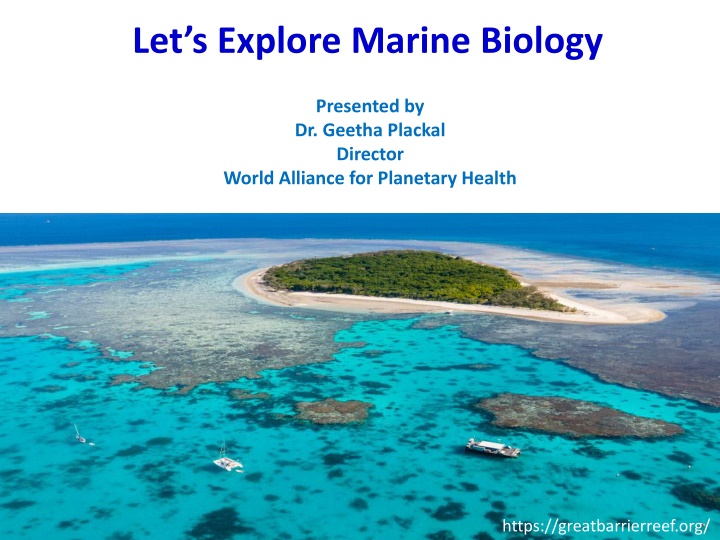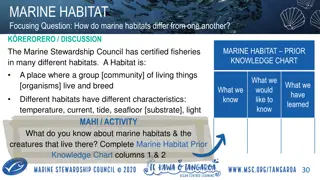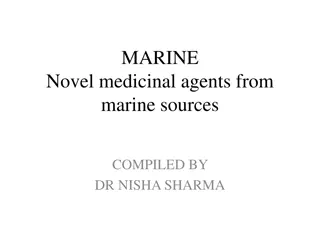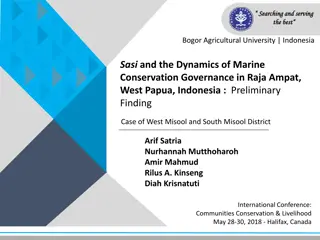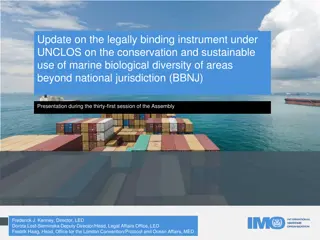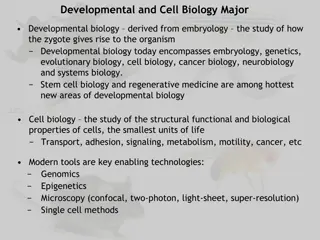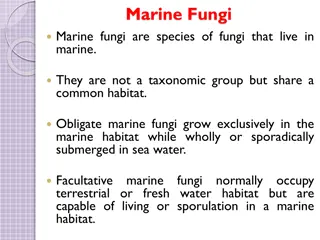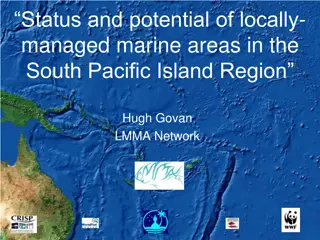Marine Biology: Importance, Scope, and Responsibilities
Exploring the realm of marine biology reveals its crucial role in understanding and preserving marine ecosystems under threat. This field offers diverse career opportunities, from research to conservation efforts. Marine biologists play a pivotal role in studying, monitoring, and protecting marine life for the sustainability of our planet.
Download Presentation

Please find below an Image/Link to download the presentation.
The content on the website is provided AS IS for your information and personal use only. It may not be sold, licensed, or shared on other websites without obtaining consent from the author.If you encounter any issues during the download, it is possible that the publisher has removed the file from their server.
You are allowed to download the files provided on this website for personal or commercial use, subject to the condition that they are used lawfully. All files are the property of their respective owners.
The content on the website is provided AS IS for your information and personal use only. It may not be sold, licensed, or shared on other websites without obtaining consent from the author.
E N D
Presentation Transcript
Lets Explore Marine Biology Presented by Dr. Geetha Plackal Director World Alliance for Planetary Health https://greatbarrierreef.org/
Why marine biology is important? Studying the sea and its complex ecosystem is not only a popular and rewarding career, but is also vital for the continued challenges facing marine environments under threat from human activities and important for conservation and protection of marine ecosystem for survival of life on earth. Marine biology is the study of organisms and ecosystems in the oceans and other saltwater environments. Marine biology is a broad-ranging career. You could go into field work, academic research, laboratory work, consulting, charity, outreach or policy making. This includes marine plants, animals and other organisms, both vertebrate and invertebrate, in deep oceans, shallow seas and the laboratory. The main aims of marine biology are to improve understanding of the marine world and to understand and predict changes in ecosystems affected by human and natural disturbances.
SCOPE Marine biologists need to get along with various people, from subordinates to peers and supervisors. Since a large proportion of the earth is full of oceans and marine bodies, the demand for Marine Biologists is rising. A Marine Biologist can easily find a job in universities and colleges as many colleges pursue Marine Biology Marine biology professionals work under many job titles like wildlife biologist, zoologist, fish and wildlife biologist, fisheries biologist, aquatic biologist, conservation biologist, and biological technician. Majority of marine biologists work in state and government agencies. Marine biotechnology and biomedical field is emerging as a specialized work opportunities in future.
Responsibilities Conducting Species Inventories, Testing And Monitoring Sea Creatures Exposed To Pollutants Collecting Samples And Data-using Processes Such As Coring Techniques, Geographic information Systems (GIS), Visual Recording And Sampling Analysing Samples In A Lab And Developing New Research Theories From Them Preserving Specimens And Samples Of Unknown Species And Diseases And Mapping The distribution, Ranges Or Movements Of Marine Populations Communicating The Latest Advances In Marine Science to The Public, Governments, agencies, And Commercial Organisations Carrying Out Environmental Impact Assessments Evaluating The Likely Environmental Impacts of A Proposed Project Or Development, Including Socio-economic, Cultural And Human-health Impacts Interviewing Local Divers, Fisherman And Stakeholders About Animal Behaviour And Local marine Practices Lecturing Or Teaching On Policy, Planning And Management Of Marine Activities Developing, Implementing And Managing Projects Relating To The Marine Environment Coordinating And Tracking Of Assignments, Scopes, Schedules Budgets And Deliverables Senior Level Management Of Existing And New Projects Within Or Outside An Academic Setting Writing Grant Proposals, Contract Negotiations, Marketing And Business Development Keeping Up To Date With New Research And Technologies And Attending Training Courses Liaising With Colleagues Across The Field Including Fellow Research Staff, Technicians, Ships' Crews And Research Assistants.
What we expect? The dress code is casual for field work and fairly informal for most marine biology roles, unless you're working for a consultancy. University work is usually office and lab-based, although these roles may include short or long-term expeditions abroad. There are plenty of opportunities to work all around the world. You'll need to be ready to seize opportunities by volunteering, interning or otherwise, to gain the experience necessary to stand out from the crowd. Field work can be arduous. You might be diving or working at sea in difficult weather conditions. Marine biology is a gender-equal career field.
Career opportunities Marine biologist Biologist Oceanography Fishery Scientist Aquarist Research Technician Biological oceanography Marine engineering Marine conservation Microbiologist Veterinarian Physical oceanography Marine Ecologist Dive Operations Manager Reef Restoration Project Manager Marine Biology Technician Research Assistant Fishery Data Manager Environmental Engineer Professor In Marine Ecology Postdoctoral Fellow Oil Spill Response Specialist Consultant In Marine Ecology Marine Biotechnologist Marine Policy Expert.
Salary India According to Payscale, the average base salary of Marine Biologist in India is 7,00,000 or 7 lakh rupees per annum. The range of the base salary is from 1.13LPA to 40LPA, while the bonus ranges from rupees 206 to 1.01 LPA. So, the total salary of a Marine Biologist in India is in the range of 1.88LPA to 30LPA Reported by Careers 360.com United kingdom Entry-level salaries start from 12,000 for research field assistant positions abroad, up to 14,000 for apprentice lab technicians and 30,000 for consultancy work. Experienced marine biologists working in the field are paid in accordance with local salaries. Salaries for PhD holders are between 26,000 and 35,000, although some marine laboratories and research organisations pay on a university lecturer scale between 28,000 and 45,000 a year (the scale for postdoctoral research positions). CEOs in non-governmental organisations (NGOs) earn upwards of 40,000, while high level research positions span up to 90,000 a year and university deans earning around 120,000. United States of America The average salary for a Marine Biologist is $18.36 per hour in United States.. The average Marine Biologist salary in the United States is $84,595 as of May 25, 2023. The range for our most popular Marine Biologist positions (listed below) typically falls between $34,370 and $134,820.
Working hours Working hours vary according to your area of work. Field work contracts are usually between 40 and 50 hours a week although the exact hours are project specific and may be dictated by the tide. This may mean some early starts and 24-hour days on field trips. If you work for a university, consultancy or NGO, your hours are usually more structured, although this may vary if you're working with academics on particular projects in offices or university, often you need to go to field for research or field study. Research work, whether you're a postdoctoral research fellow or professor, can be very flexible because you're managing your own research. However, research jobs are typically offered on short-term contracts (12-24 months) as projects are typically funded by grants. Part-time works are also available Paid internship/ trainee opportunities are also available
Education You need a bachelor's degree, such as BSc in marine biology or a related field like oceanography, marine science or earth science. You can pursue a master's degree after bachelors degree, such as MSc in marine biology. If we wish we ca continue study as MPhil Course. If we have PhD degree, it will be more helpful to get a senior positions .These degrees can help you land an entry-level job as a marine biologist. Marine Biology Marine Biology And Coastal Ecology/Oceanography Marine Science Ocean And Earth Science Oceanography.
Skills Skills are mainly based on your expertise and it may be need to learn new skills base nature of the job Accuracy And Attention To Detail, For Recording Observations And Results Excellent Problem-solving Skills To Find Solutions To Problems Research Skills Like Collecting And Analysing Data As Well As Publishing Results Teamwork Skills, Whether Working As Part Of A Research Team In a Laboratory Or An Expedition Team At Sea Observation Skills For Studying Sea Life For Long Periods Of Time A Methodical And Analytical Mind For Analysing And Interpreting Data Strong Communication Skills For Report Writing, Academic Publications, Press Releases, Grant Applications, Environmental Impact Assessments, Conference Presentations And Standing Out In Job Applications Practical Skills, Such As Diving, Boat Driving And First Aid Flexibility To Deal With Possible Short-term Work Contracts, In Other Countries And In Basic Living Conditions And All Types Of Weather.
Work experience Voluntary experience is helpful to stand out from the competition you can assist with their projects in university supervisors, professors, lab technicians or PhD students. You can also attend conferences, present papers and volunteer as a research assistant to a specialist. Writing speculative applications to organisations that interest you such as aquariums, museums or environmental consultancies, so you can build up a range of skills and work out what you enjoy before specialising. Field work, consider volunteering for local wildlife trusts, marine conservation organizations, local charities, ocean clean-up organisations, and sanctuaries and rescue centres (this includes paid-for experiences across the world). Get involved in related societies or groups during your degree. Keep a record of any voluntary experience and holiday work you've done, including field trips. It s a good idea to become a student member with a relevant professional body such as the Marine Biological Association (MBA). This provides you with access to the member community for networking purposes, as well as discounts on training and events
Professional Development Marine biology is an ever-evolving field so continuous professional development (CPD) in relevant research, technical and practical skills is a key part of the work. It also evidences your commitment, passion and drive. Training courses and workshops are offered by organisations such as the Marine Biological Association and the Institute of Marine, Science and Technology. Professional courses and scientific talks, communication, article publishing Guest lectures/teaching assistant in labs and aquariums etc These all will be helpful to get hired too higher postions
Reference https://www.prospects.ac.uk/job-profiles/marine-biologist
